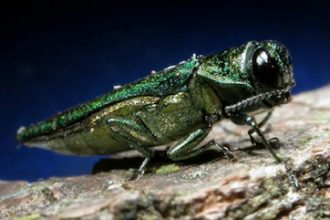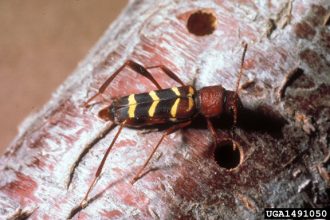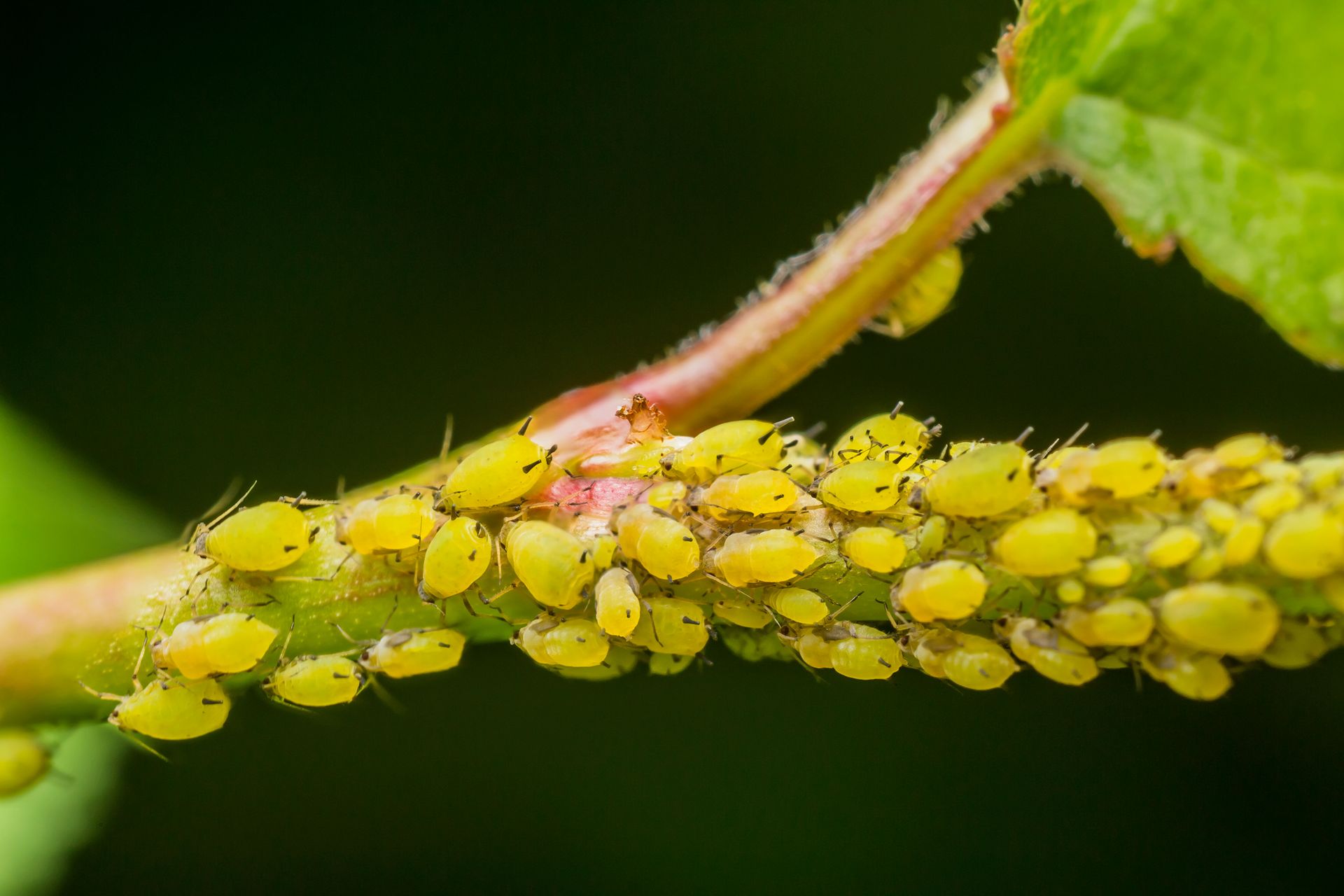TREE INSECT CONTROL SERVICE
Pest Control Services for Trees
A Smarter Approach: Integrated Pest Management for Trees
When it comes to tree insect control services, Organo-Lawn takes a targeted, eco-friendly approach that sets us apart from typical tree care services. Instead of blanket-spraying chemicals, we carefully assess each tree to determine whether it needs proactive treatment or reactive care. This minimizes insecticide use, ensuring effective protection while keeping your landscape environmentally friendly.
Watering Correctly to Prevent Tree Pests
Did you know that proper watering can reduce insect pressure on trees by up to 90%? Many tree pest issues stem from overwatering or drought stress
- Austrian pines attacked by
- Zimmerman moths are often overwatered.
- Ash trees infested with lilac borers typically suffer from drought stress.
Following the 1-2-3-2-1 lawn watering technique helps create stronger, healthier trees that are naturally more resistant to pests. Improve your watering habits and protect your trees the smart way!
Ips Beetle
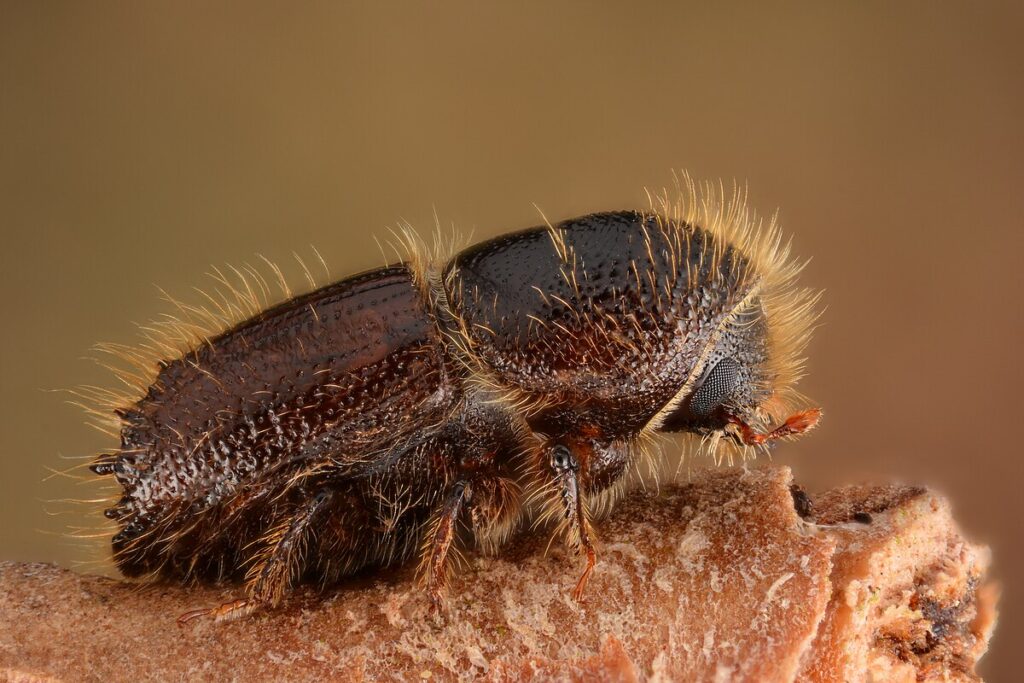
Organo-Lawn Uses No Aerial Sprays for Trees
What Are Soil Drench Insecticides?
Soil drench insecticides offer a smarter, more effective alternative to aerial sprays for tree pest control. Applied at the base of the tree, they are absorbed through the roots and distributed systemically throughout the tree’s vascular system, providing year-long protection against pests.
Why Choose Soil Drenches?
✔ Protects Pollinators – Unlike aerial sprays, soil drenches don’t harm beneficial insects like bees and butterflies.
✔ Minimizes Pesticide Drift – Reduces exposure to surrounding plants, water sources, and non-target organisms.
✔ Fewer Applications Needed – Unlike sprays that require precise timing and multiple treatments, soil drenches provide consistent, long-lasting protection.
By using soil drenches, Organo-Lawn ensures effective pest control while prioritizing the health of your trees and the environment.
Soil Drench Technique
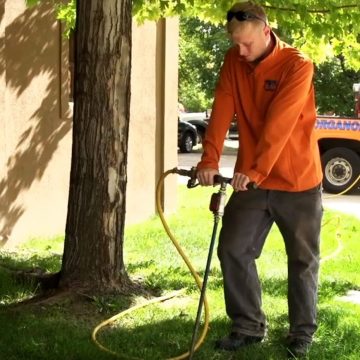
Soil Drench Insecticide Pricing
Based on Trunk Diameter (DBH)
Preventative Insect Control for Trees*
Using Criterion Insecticide (Imidacloprid)
Up to 1 Year of Control
* Minimum Purchase of $75 is Required
Tree Trunk Diameter (DBH)** – Cost Per Tree
Flowers – $2.25
Small Shrubs 6″ or Less – $4.50
Medium Shrubs 6-18″ – $7.50
Large Shrubs 18″ or Taller – $9.50
1″ Tree Trunk Diameter – $13.00
2″ Tree Trunk Diameter – $17.50
3″ Tree Trunk Diameter – $22.25
4″ Tree Trunk Diameter – $27.00
5″ Tree Trunk Diameter – $31.75
6″ Tree Trunk Diameter – $36.25
7″ Tree Trunk Diameter – $41.00
8″ Tree Trunk Diameter – $45.75
Larger Sized Trees – Call for Pricing
Volume Discounts:
5% off orders over $100.00
10% off over $200.00
15% off over $300.00
** DBH = (Diameter Breast Height)
Reactive and Preventative Insect Control for Trees*
Using Safari Insecticide (Dinotefuran)
Up to 1 Year of Control
*Minimum Purchase of $85 is Required
Tree Trunk Diameter (DBH)** – Cost Per Tree
Flowers – $6.25
Small Shrubs 6″ or Less – $14.50
Medium Shrubs 6-18″ – $24.00
Large Shrubs 18″ or Taller – $36.50
1″ Tree Trunk Diameter – $14.00
2″ Tree Trunk Diameter – $19.50
3″ Tree Trunk Diameter – $23.75
4″ Tree Trunk Diameter – $31.00
5″ Tree Trunk Diameter – $38.50
6″ Tree Trunk Diameter – $45.75
7″ Tree Trunk Diameter – $53.00
8″ Tree Trunk Diameter – $60.25
Larger Sized Trees – Call for Pricing
Volume Discounts:
5% off orders over $100.00
10% off over $200.00
15% off over $300.00
** DBH = (Diameter Breast Height)
How to Measure
a Tree's Trunk Diameter
Proper Lawn Watering can Reduce Insect Pressure on Tress
Pesticide Information Fact Sheets
Criterion
Preventative Insecticide for Trees (Imidacloprid)
CRITERION LABEL
CRITERION SDS
IMIDACLOPRID FACT SHEET
EPA Registration Number for Criterion 75 WSP Insecticide is EPA Reg. No. 432-1318
Criterion 75 WSP is also registered with the Colorado Department of Agriculture.
Safari 20G Insecticide
Reactive and Preventative Insecticide for Trees (Dinotefuran)
SAFARI 20G LABEL
SAFARI 20G SDS PDF
DINOTEFURAN EPA FACT SHEET
EPA Registration Number for Safari 20G Insecticide is
EPA Reg. No. 86203-11-59639
Safari 20G is also registered with the Colorado Department of Agriculture.
Which Tree Insects are Controlled by Criterion or Safari?
Criterion and Safari are highly effective systemic insecticides that protect trees from a wide range of damaging pests. These treatments are absorbed through the roots and distributed throughout the tree’s vascular system, delivering long-lasting, season-wide protection.
Common Tree Pests Controlled
✔ Aphids – Prevents leaf curling, honeydew buildup, and sooty mold.
✔ Bagworms – Prevents damage caused by larvae feeding on leaves.
✔ Emerald Ash Borers – Protects ash trees from severe infestations.
✔ Japanese Beetles – Prevents defoliation caused by adult beetles.
✔ Lace Bugs – Protects against stippling damage on leaves.
✔ Leafhoppers – Reduces feeding damage and disease transmission.
✔ Leafminers – Controls larvae that tunnel inside leaves, reducing plant stress.
✔ Mealybugs – Reduces cotton-like infestations that weaken trees.
✔ Psyllids – Stops leaf curling and plant decline.
✔ Sawflies – Prevents defoliation from larvae feeding on foliage.
✔ Scale Insects – Controls soft and armored scales that weaken trees.
✔ Spittlebugs – Protects against excessive sap-sucking damage.
✔ Thrips – Stops leaf scarring and distortion.
✔ Whiteflies – Prevents leaf yellowing and plant stress.
With just one application, Criterion or Safari provide season-long protection, keeping your trees healthy, resilient, and pest-free with minimal environmental impact.
Aphid Pressure on a Tree
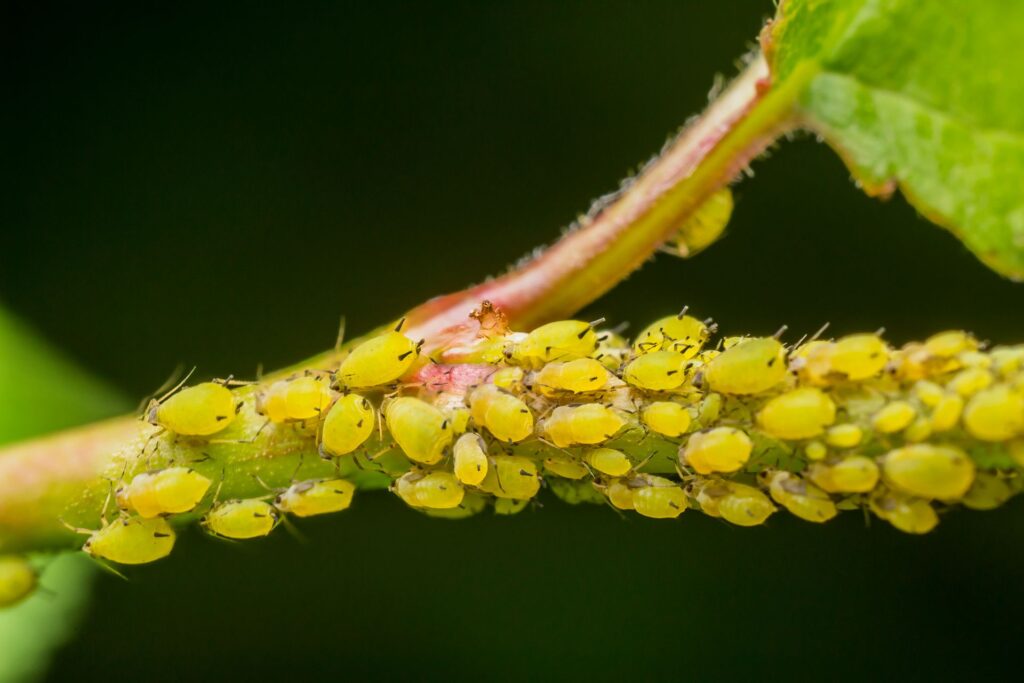
Are Tree Insect Control Services Safe for Honeybees?
Soil Drench vs. Aerial Spray
At Organo-Lawn, we are committed to protecting honeybees and the environment. That’s why we DO NOT use aerial applications of Criterion or Safari—both of which belong to the neonicotinoid family and can be highly toxic to bees when sprayed.
Why We Only Use Soil Drench Applications
Extensive research shows that when Criterion and Safari are applied as soil drenches, honeybees do not come into contact with the active ingredients Imidacloprid or Dinotefuran. These compounds do not penetrate the abscission layer of the tree, meaning they never reach the flowers or pollen, keeping pollinators safe.
If credible scientific evidence suggests otherwise, we will immediately discontinue the use of these insecticides.
Bee Friendly
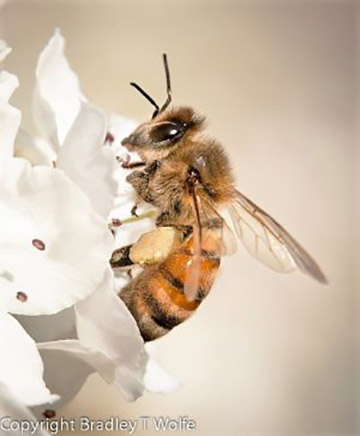
Our Alternative Options: Neonicotinoid-Free Insect Control
Lalguard – Neem Oil-Based Solution
For those concerned about neonicotinoids, we offer Lalguard, a tree insect control product derived from neem oil—a natural and environmentally friendly alternative.
Trunk Injection for Precision Treatment
- Lalguard is applied via trunk injection, delivering targeted pest control once a year.
- This method minimizes environmental exposure while effectively protecting trees.
Not Sure What’s Right for Your Trees?
Tree insect control services can be complex, so we recommend consulting with our tree care experts to determine the best solution for your landscape.
Natural Insecticide
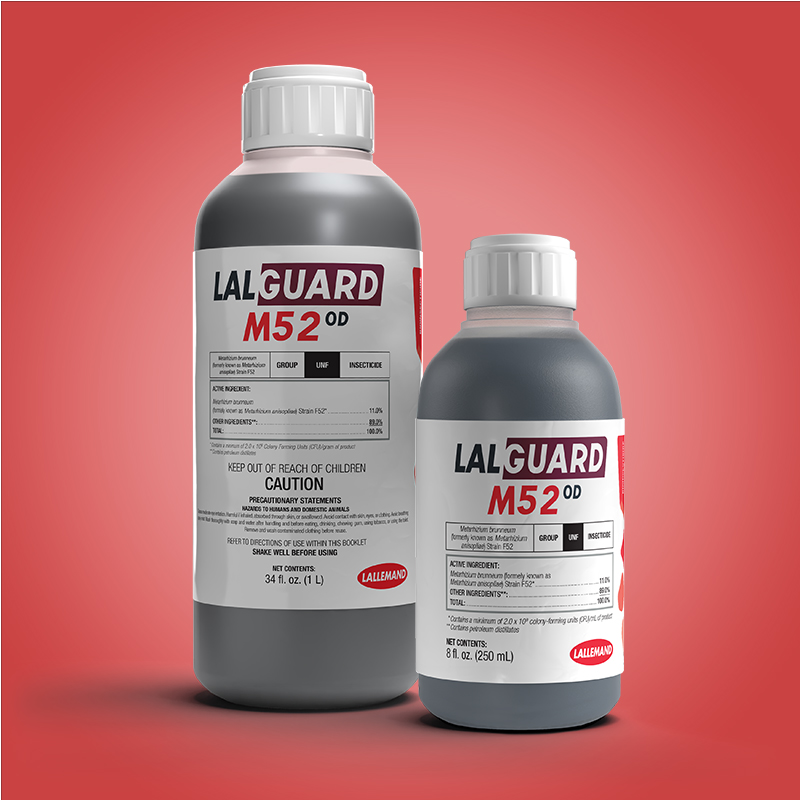
Tree Insect Control Services
Schedule an Expert Tree Care Evaluation
Professional Tree Care Services
Choosing the right insect control for your trees can be challenging due to the different product functions. Contact our office today to consult with a tree care expert and get your questions answered.
Organo-Lawn of Boulder (303) 499-2000 or Fort Collins (970) 225-9425
Tree Insect Control Services FAQs
Is Imidacloprid Safe for Bees?
As an Aerial Spray – No / As a Soil Drench – Yes
The active ingredient in the insecticides Criterion and Merit is Imidacloprid, which belongs to the neonicotinoid family of pesticides. Scientific studies have shown that neonicotinoids are highly toxic to honeybees. When Imidacloprid is applied to the foliage of a tree through aerial spraying, it can be extremely harmful to honeybees. However, studies indicate that when Imidacloprid is applied using the soil drench method, there is no evidence that honeybees come into contact with the insecticide.
Additional Tree Insect Control Service FAQs
Imidacloprid is a systemic insecticide that targets various pests by affecting their nervous system. It is commonly used for lawn, tree, and agricultural pest control, as well as in flea treatments for pets.
It is absorbed by plants through the roots when applied as a soil drench. When insects feed on treated plants, they ingest the toxin, leading to paralysis and death.
If applied as a soil drench, Criterion and Safari can remain active in plants for around one year. Soil drenches provide longer protection, while foliar sprays break down more quickly.
When applied as a soil drench, Criterion and Safari have a lower risk of harming beneficial insects like pollinators and predators (e.g., ladybugs, and lacewings) compared to foliar sprays. However, it can still impact soil-dwelling beneficial insects, such as earthworms and certain predatory beetles, depending on soil conditions and application rates.
When applied as a soil drench, imidacloprid absorption time depends on tree size, soil conditions, and environmental factors. However, general estimates are:
Small trees (1-5 inches in diameter): 1-2 weeks for uptake and systemic movement.
Medium-sized trees (5-10 inches in diameter): 3-4 weeks for full absorption.
Large trees (over 10 inches in diameter): 4-8 weeks for the insecticide to fully distribute throughout the canopy.
Factors Affecting Uptake Speed:
Soil Moisture: Proper watering before and after application speeds up absorption. Dry soil slows uptake.
Soil Type: Sandy soils allow faster absorption, while clay-heavy soils slow movement.
Tree Health: Stressed or unhealthy trees may take longer to absorb the treatment.
Temperature: Warmer temperatures encourage root activity and faster uptake.
Best Practices for Fast & Effective Absorption:
- Water the soil before application to improve uptake.
- Apply in early spring or late summer for optimal root activity.
- Keep soil moist (not saturated) after application to help transport the insecticide.
- Avoid applying in extremely dry or cold conditions, as root absorption will be slower.
When Will the Insecticide Start Working?
- For root-feeding pests (like grubs): 1-2 weeks after uptake.
- For sap-sucking insects (like aphids and leafhoppers): 4-6 weeks after application.
- For wood-boring insects (like emerald ash borers): 6-8 weeks for full protection.
Safari (Dinotefuran) is a systemic insecticide that is absorbed through the tree’s roots and transported through the vascular system to protect against pests. It is known for its fast uptake and quick action compared to other insecticides like imidacloprid.
General Uptake Time by Tree Size:
- Small trees (1-5 inches in diameter): 1-3 days
- Medium trees (5-10 inches in diameter): 3-7 days
- Large trees (over 10 inches in diameter): 7-14 days
Factors That Influence Absorption Speed:
Faster than imidacloprid – Dinotefuran moves quickly through tree tissue, offering faster protection.
Soil Moisture – Adequate watering before and after application speeds up uptake.
Soil Type – Sandy soils allow for faster absorption, while clay-heavy soils slow movement.
Tree Health – Healthy trees absorb treatments faster; stressed or drought-affected trees may take longer.
Temperature – Warmer temperatures encourage root activity, leading to faster uptake.
How Soon Does Safari Start Working?
- Sap-sucking insects (aphids, scales, lace bugs): 24-48 hours after absorption.
- Leaf-feeding pests (leafhoppers, caterpillars, beetles): 3-5 days after absorption.
- Wood-boring pests (emerald ash borer, bark beetles): 7-14 days for full systemic protection.
Best Practices for Fast & Effective Absorption:
- Water the soil before and after application to improve uptake.
- Apply in spring or early summer when trees are actively growing.
- Keep soil consistently moist (not waterlogged) to aid movement.
- Avoid applying in extreme drought conditions, as root uptake will be slower.
Why Choose Safari (Dinotefuran)?
- Faster absorption than imidacloprid (weeks vs. days).
- Better movement through trees for quicker pest control.
- Highly effective against difficult pests like armored scales and borers.
Why Choose Criterion (Imidacloprid)?
- Less Expensive than Safari
- Just as effective as Safari on many insects – but must be applied 3-5 weeks before insect pressure.
We will determine which product to recommend based on the season and the specific insect species we aim to control. If the less expensive Criterion option is suitable, we will suggest it.
